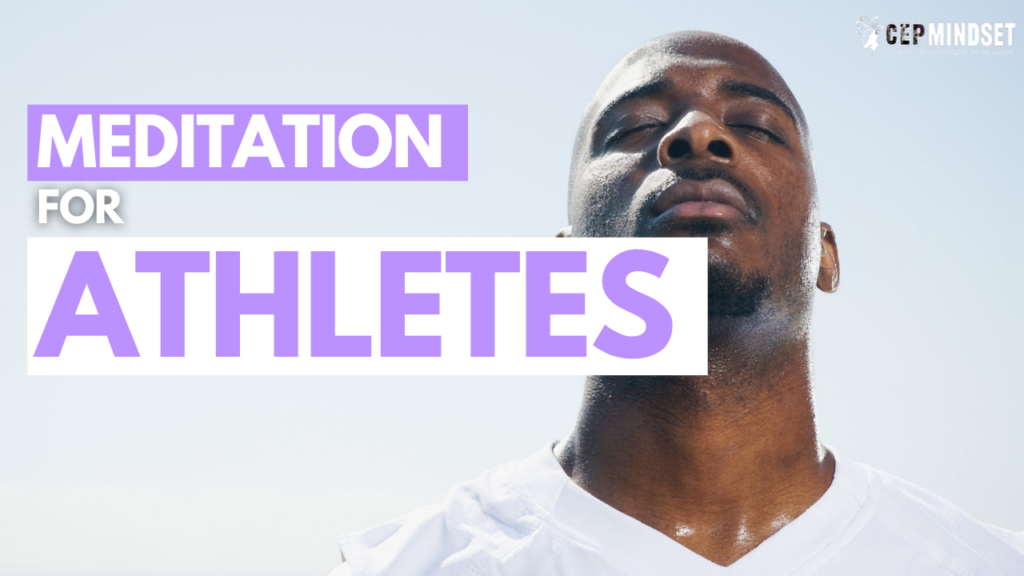
Should athletes meditate?
In short the answer is yes, but when and how can vary from one athlete to the next.
There are various ways to meditate, some of which will surprise you – more on this below, but the end goal is to find a mindfulness practice that works for you.
It might not be worth pushing a more classic meditation practice on an athlete under 13. But comparatively it should be a no brain to add it as a daily habit for athletes 18 and older.
Regardless, it is not something you need to do, but choosing to build a mindfulness practice that works for you will have a massive impact in all areas of your life.
This is not something I’m just making up, it is supported by a robust amount of research.
The Big 4
The most researched and proven ways to improve performance, physical health, and mental well-being are what Dan Harris calls the big 4:
- Sleep
- Nutrition
- Exercise
- Meditation
I think this is a great frame of reference for understanding the impact of meditation.
If you don’t sleep well you will lose your ability to concentrate, regulate your emotions, and a handful of other physical and mental drawbacks. Athletes need to learn to win the sleep game.
If you don’t eat well the physical drawbacks are obvious but how and when you eat has also been well documented to impact your mental health and performance.
If you don’t exercise well there are also physical and mental health drawbacks, but as an elite athlete you should have this one well covered.
Sleep, nutrition and exercise should come as pretty obvious ways to optimize your performance and health.
But meditation is also proven to significantly impact your performance, physical health, and mental well-being.
Yet it is by far the most under-utilized by society and specifically athletes.
What is Meditation?
One of the biggest barriers holding people back from developing a consistent meditation practice is they struggle to understand what it is and how it works.
This is because you are not really doing anything. Instead you are slowing down, being mindful, and being present.
When you exercise, you get stronger.
When you go to sleep, you wake up rested.
When you eat well, you have fueled your body.
But when you meditate it is hard to notice any instant results.
Meditation is the practice of being mindful of our thoughts and feelings.
In a world where we are constantly doing things, being entertained, and going from one thing to the next, we don’t slow down to be with and regulate our thoughts and feelings.
Yet emotional regulation and the ability to mindfully process our thoughts is an incredibly valuable skill.
But the only way to improve those skills is to practice them – just like any other skill.
Slow Down to Speed Up
I love the race car analogy of slowing down to speed up.
F1 race cars have to take pit stops in order to fuel up and change their tires in order to complete the race. If they don’t, then they will either run out of fuel or even worse – crash and burn.
Similarly, they don’t go full speed through a corner, they slow down then speed up out of the corner.
Yet western society very much has normalized the go, go, go approach – busy is good – and rarely slows down, self-evaluates, and takes care of the car, so we can actually go faster.
So my challenge for you is to start embracing the slow down to speed up mentality.
This is a necessary mindset in order for you to carve out the time and effectively improve your ability to regulate your emotions, mindfully process your thoughts, and be present.
How to Meditate
This is where things get interesting.
There is no right or wrong way to meditate or aka develop a mindfulness practice.
You can have a poor sleep.
You can eat unhealthy foods.
You can hurt yourself exercising.
But as long as you are practicing mindfulness then you are winning the meditation game.
Whether your mind is busy during practice or completely calm – it doesn’t matter. Your meditation practice will depend on your unique personality and the type of day you are having.
Whether you focus on your breath, repeat a mantra, practice gratitude, or follow a guided meditation – it doesn’t matter. As long as you show up, then you are winning the meditation game.
The reality is all the mental game strategies we use with athletes and high-performers are based on mindfulness.
For example here is our 4 fundamental strategies:
- Alter Ego – is about becoming more self-aware of how you want to show up in a given moment.
- Reset Routine – is about learning to be aware of your thoughts and feelings, accept them so you can let them go, and fully commit to the task at hand.
- Personal Scorecard – is about taking the time to self-reflect on the mindset and processes that matter most to you – defining your own definition of success – this daily practice has a compounding effect of improving your self-awareness so you can better self-regulate.
- Mental Preparation – is about mindfully setting your intentions on how you want to show up – specifically utilizing the power of imagery to vividly prepare yourself for what you want to do and how you want to feel while you do it.
As you can see these are all heavily based on building self-awareness through different mindfulness techniques.
We teach these techniques to our clients before encouraging a more classic meditation practice because they are more tangible and easier strategies to get clients to embrace. We also find they are the best way to get quick and effective results.
But the reality is a more classical meditation practice has more research backing the overall benefits.
Interestingly, the 4 fundamental strategies can be classified as mindfulness practices, so if you are using these strategies you might not need to add a more classic meditation practice.
Classic Meditation Practices
Nonetheless, if you are willing to give it a go, I highly recommend adopting a classic meditation practice.
Here are some tips to help you get started:
Types of Meditations
- Breath focused: focus on your breath, when your mind wanders, bring it back to your breath.
- Body scan: focus on the sensations in your body, relaxing your muscles, if your mind wanders, then bring it back to the sensations in your body. Aka progressive relaxation… link?
- Gratitude: focus on big and little things that you appreciate, generating a sense of internal gratitude for your life, if your mind wanders, then bring it back.
- Mantra: pick a mantra and repeat it over and over in your head or out loud. If your mind wanders, then bring it back to the mantra.
- Movement: yoga, tai chi, racking sand
Guided Meditations & Apps
Check out these guided meditation we create:
You can also use one of these popular apps:
- Headspace: https://www.headspace.com/
- Insight Timer: https://insighttimer.com/en-ca
- Calm: https://www.calm.com/
- Muse: https://choosemuse.com/
- HeartMath: https://www.heartmath.com/
When & Where Best Practices
I recommend trying it out for at least 2 mins and either in the morning or mid-day. You can do it at night but if you fall asleep while doing it then you won’t be getting the full benefits.
You should be sitting up right with good posture and most people prefer a quiet place. You could have distracting noises around – which will be good practice for letting go and coming back to the present.
Building a Habit that Sticks
The goal is this becomes a lifelong habit. It doesn’t have to be something you do everyday, but you do want to make it part of your routines and rituals. Here are some suggestions to help the habit stick:
- Pick a time of day and location that works for you
- Find a type of meditation and a practice you enjoy doing
- Set a daily alarm to remind you to meditate at the time you want
- Track it on paper or on an app for the first month to see the habit form
- Pair it with a habit you already have – ie I always meditate before breakfast
- Get an accountability partner to either do it with you or share that you are doing it
I hope this article taught you something about mindfulness and inspired you to give it a try.
Please share this with anyone you think would be interested.

 Nicholas is a Senior High-Performance Coach and holds a doctorate in Sport & Exercise Psychology. From his specialized psychology research program, to his PhD studies, Nicholas has gained a tremendous foundation of knowledge and appreciation for the human experience. His passion for psychology has accumulated to a commitment to studying and applying performance psychology and stoicism. This commitment has led Nicholas to conduct many research studies focusing on understanding why and how some people thrive and prosper while others do not. His admiration for evidence-based solutions has propelled Nicholas to produce studies revolving around mindfulness, grit (perseverance and passion), performance, quality participation, social relationships, and well-being.
Nicholas is a Senior High-Performance Coach and holds a doctorate in Sport & Exercise Psychology. From his specialized psychology research program, to his PhD studies, Nicholas has gained a tremendous foundation of knowledge and appreciation for the human experience. His passion for psychology has accumulated to a commitment to studying and applying performance psychology and stoicism. This commitment has led Nicholas to conduct many research studies focusing on understanding why and how some people thrive and prosper while others do not. His admiration for evidence-based solutions has propelled Nicholas to produce studies revolving around mindfulness, grit (perseverance and passion), performance, quality participation, social relationships, and well-being. A Native of Quebec, Sara was part of the St. Lawrence University Women’s Ice Hockey team that competed in the NCAA Division 1 hockey league ECAC. During this time, Sara helped her team appear in four ECAC Hockey Tournaments and two NCAA Frozen Fours, and was a four-time member of the ECAC Hockey All-Academic Squad. Following her career at St. Lawrence University, Sara played one year of professional hockey with Lugano, where she truly honed her skills in understanding the intricate connection between mindset and performance.
A Native of Quebec, Sara was part of the St. Lawrence University Women’s Ice Hockey team that competed in the NCAA Division 1 hockey league ECAC. During this time, Sara helped her team appear in four ECAC Hockey Tournaments and two NCAA Frozen Fours, and was a four-time member of the ECAC Hockey All-Academic Squad. Following her career at St. Lawrence University, Sara played one year of professional hockey with Lugano, where she truly honed her skills in understanding the intricate connection between mindset and performance.
 Blair has over 13 years of experience as a Professional Dancer, Assistant Dance Captain & Cast Manager, as well as an additional 17 years of training. Over the last 3 decades, she has lived and experienced first hand the highest of highs & lowest of lows that come with pursuing a career in the Performing Arts.
Blair has over 13 years of experience as a Professional Dancer, Assistant Dance Captain & Cast Manager, as well as an additional 17 years of training. Over the last 3 decades, she has lived and experienced first hand the highest of highs & lowest of lows that come with pursuing a career in the Performing Arts.

 Natasha Habert draws from her training in sport and performance psychology, personal experiences as a competitive athlete, and deep passion for consistent high performance. She is a lifelong athlete and high performer, excelling in volleyball as both a player and coach.
Natasha Habert draws from her training in sport and performance psychology, personal experiences as a competitive athlete, and deep passion for consistent high performance. She is a lifelong athlete and high performer, excelling in volleyball as both a player and coach. Luciano’s hockey career is highlighted by his time playing college at the University of Victoria and two professional seasons in Europe. Throughout his career, he struggled with performance anxiety, a lack of consistency, fluctuations in confidence, and being caught in the results trap. This eventually led him to deviate from the main reason why anyone should play sports – for the enjoyment of the game. As a former athlete, Luciano has a unique understanding of the psychological pressures and struggles that athletes experience.
Luciano’s hockey career is highlighted by his time playing college at the University of Victoria and two professional seasons in Europe. Throughout his career, he struggled with performance anxiety, a lack of consistency, fluctuations in confidence, and being caught in the results trap. This eventually led him to deviate from the main reason why anyone should play sports – for the enjoyment of the game. As a former athlete, Luciano has a unique understanding of the psychological pressures and struggles that athletes experience. Alexis Woloschuk is a name synonymous with mental fortitude in the world of professional hockey. Throughout her career originating playing boys hockey, going to an academy away from home, playing her four years at Boston University and 7+ years in pro hockey she’s learned the importance of resilience, confidence, and dismissing both fear and other’s opinions. With a blend of relatability, confidence, and an acute understanding of playing to one’s potential, Alexis helps athletes reshape the way they perceive and harness the power of their minds.
Alexis Woloschuk is a name synonymous with mental fortitude in the world of professional hockey. Throughout her career originating playing boys hockey, going to an academy away from home, playing her four years at Boston University and 7+ years in pro hockey she’s learned the importance of resilience, confidence, and dismissing both fear and other’s opinions. With a blend of relatability, confidence, and an acute understanding of playing to one’s potential, Alexis helps athletes reshape the way they perceive and harness the power of their minds. Sean Mahoney is a member of the Association for Applied Sport Psychology (AASP), and a Master’s candidate in the Sport and Performance Psychology program at the University of Denver. For as long as he can remember, Sean has been fascinated by human performance and how to gain an edge over the competition. For most of his athletic career, he focused on the physical aspect of performance but neglected the mental. Because of this, he struggled with performance anxiety, focus issues, and limiting beliefs pertaining to confidence and self-doubt. His lack of focus on optimizing his mental game prevented him from reaching his full potential.
Sean Mahoney is a member of the Association for Applied Sport Psychology (AASP), and a Master’s candidate in the Sport and Performance Psychology program at the University of Denver. For as long as he can remember, Sean has been fascinated by human performance and how to gain an edge over the competition. For most of his athletic career, he focused on the physical aspect of performance but neglected the mental. Because of this, he struggled with performance anxiety, focus issues, and limiting beliefs pertaining to confidence and self-doubt. His lack of focus on optimizing his mental game prevented him from reaching his full potential. Savannah Fitzgerald is earning her M.A. in Kinesiology, Sport Psychology Option at California State University, Fresno. Possessing an internal motor that fires her rage for success, Savannah forged this attribute over five years while competing as an NCAA D-I water polo player and swimmer. Combined with her opportunity to represent and compete for the United States, she feels that sport has significantly impacted her professional development. Due to her personal experience playing at all levels, Savannah’s passion for mental performance began when she struggled to overcome pre-competition nerves and post-competition processing. When she discovered a world out there that people were referring to as ‘sport psychology,’ she felt like a piece of her brain was unlocked. Reality shifted as she stumbled into a space consisting of the most beautiful blend of elite performance, mental well-being, and athletics.
Savannah Fitzgerald is earning her M.A. in Kinesiology, Sport Psychology Option at California State University, Fresno. Possessing an internal motor that fires her rage for success, Savannah forged this attribute over five years while competing as an NCAA D-I water polo player and swimmer. Combined with her opportunity to represent and compete for the United States, she feels that sport has significantly impacted her professional development. Due to her personal experience playing at all levels, Savannah’s passion for mental performance began when she struggled to overcome pre-competition nerves and post-competition processing. When she discovered a world out there that people were referring to as ‘sport psychology,’ she felt like a piece of her brain was unlocked. Reality shifted as she stumbled into a space consisting of the most beautiful blend of elite performance, mental well-being, and athletics. Gabe is currently completing his Master’s in Counselling Psychology at the University of Victoria. Although Gabe played several years of high-level baseball, including a stint in the British Columbia Premier Baseball League (BCPBL), he chose hockey as his sport to pursue at the highest level possible. Gabe went on to play four years of junior hockey with the Richmond Sockeyes in the Pacific Junior Hockey League (PJHL) while also coaching minor hockey. Prior to junior hockey, Gabe played 3 years in the Canadian Sport School Hockey League (CSSHL) where he experienced the pressures and expectations of moving on to the next level. During those three years, Gabe constantly compared himself to others and struggled with coping when things did not go his way. Over time, he learned how to focus on his own process and path to the next level, while also developing strategies to improve well-being.
Gabe is currently completing his Master’s in Counselling Psychology at the University of Victoria. Although Gabe played several years of high-level baseball, including a stint in the British Columbia Premier Baseball League (BCPBL), he chose hockey as his sport to pursue at the highest level possible. Gabe went on to play four years of junior hockey with the Richmond Sockeyes in the Pacific Junior Hockey League (PJHL) while also coaching minor hockey. Prior to junior hockey, Gabe played 3 years in the Canadian Sport School Hockey League (CSSHL) where he experienced the pressures and expectations of moving on to the next level. During those three years, Gabe constantly compared himself to others and struggled with coping when things did not go his way. Over time, he learned how to focus on his own process and path to the next level, while also developing strategies to improve well-being. Louie is a mental performance coach from Toronto, Canada with a professional hockey career spanning over 14 years. Being a standout player at the University of Michigan, Louie was a Hobey Baker finalist and a 1st team All-American, which led him to getting drafted by the Ottawa Senators and playing in renowned leagues across the globe, including the DEL, SHL, and AHL.
Louie is a mental performance coach from Toronto, Canada with a professional hockey career spanning over 14 years. Being a standout player at the University of Michigan, Louie was a Hobey Baker finalist and a 1st team All-American, which led him to getting drafted by the Ottawa Senators and playing in renowned leagues across the globe, including the DEL, SHL, and AHL.
 Mia Landry is a former varsity hockey player at Brock University, where she competed at the USPORT level and was part of the 2021-22 OUA gold medal team. Mia currently represents Canada on the Women’s National Ball Hockey team and is pursuing a Master of Kinesiology Sport Psychology at her alma mater. Her research focuses on areas such as team cohesion, group dynamics, leadership styles, and sports culture.
Mia Landry is a former varsity hockey player at Brock University, where she competed at the USPORT level and was part of the 2021-22 OUA gold medal team. Mia currently represents Canada on the Women’s National Ball Hockey team and is pursuing a Master of Kinesiology Sport Psychology at her alma mater. Her research focuses on areas such as team cohesion, group dynamics, leadership styles, and sports culture. As a former member of McMaster University’s women’s soccer team, Emilie intimately understands the demands and challenges athletes face on and off the field. Although she encountered many challenges as a high-level athlete, particularly struggling with self-doubt and overthinking, Emilie was able to make a remarkable transformation when she began to embrace the principles of sports psychology.
As a former member of McMaster University’s women’s soccer team, Emilie intimately understands the demands and challenges athletes face on and off the field. Although she encountered many challenges as a high-level athlete, particularly struggling with self-doubt and overthinking, Emilie was able to make a remarkable transformation when she began to embrace the principles of sports psychology. Max is currently attending William James College, where he is earning a Doctorate Degree in Clinical Psychology and a Masters Degree in Professional Psychology. During his time as an undergraduate student, Max was inducted into the International Honor Society in Psychology (Psi Chi), and played on the Quinnipiac University men’s club ice hockey team.
Max is currently attending William James College, where he is earning a Doctorate Degree in Clinical Psychology and a Masters Degree in Professional Psychology. During his time as an undergraduate student, Max was inducted into the International Honor Society in Psychology (Psi Chi), and played on the Quinnipiac University men’s club ice hockey team.







